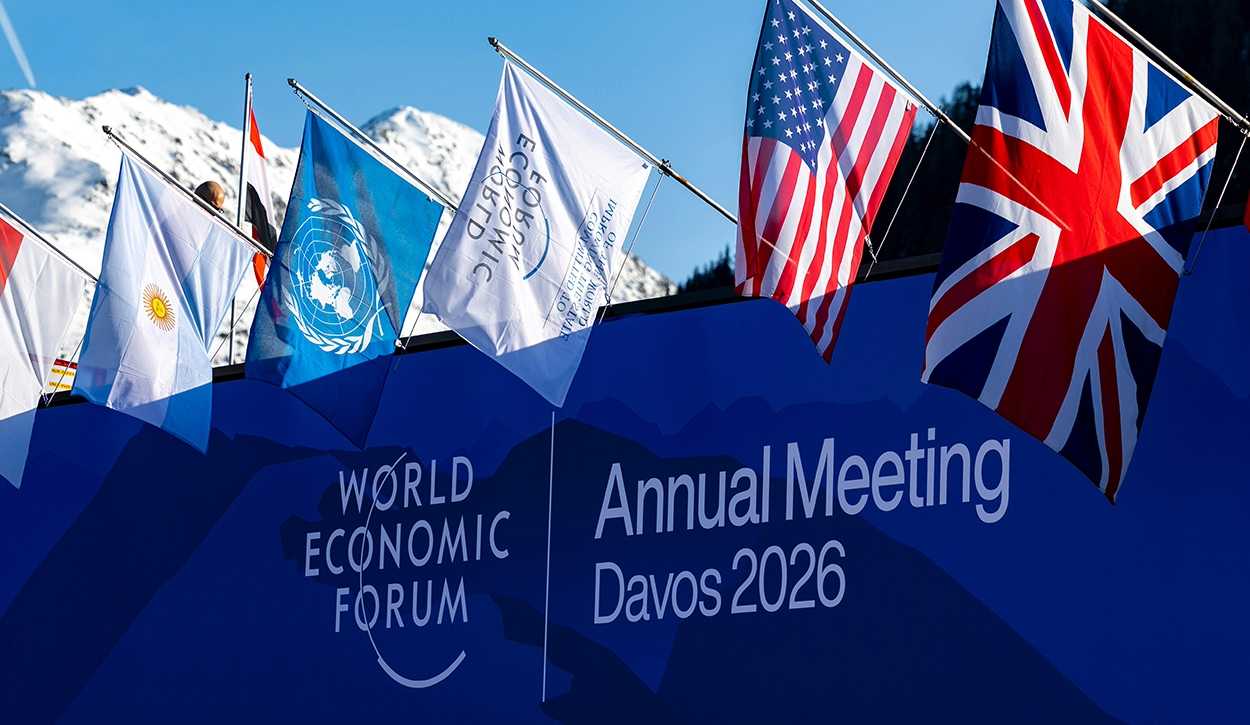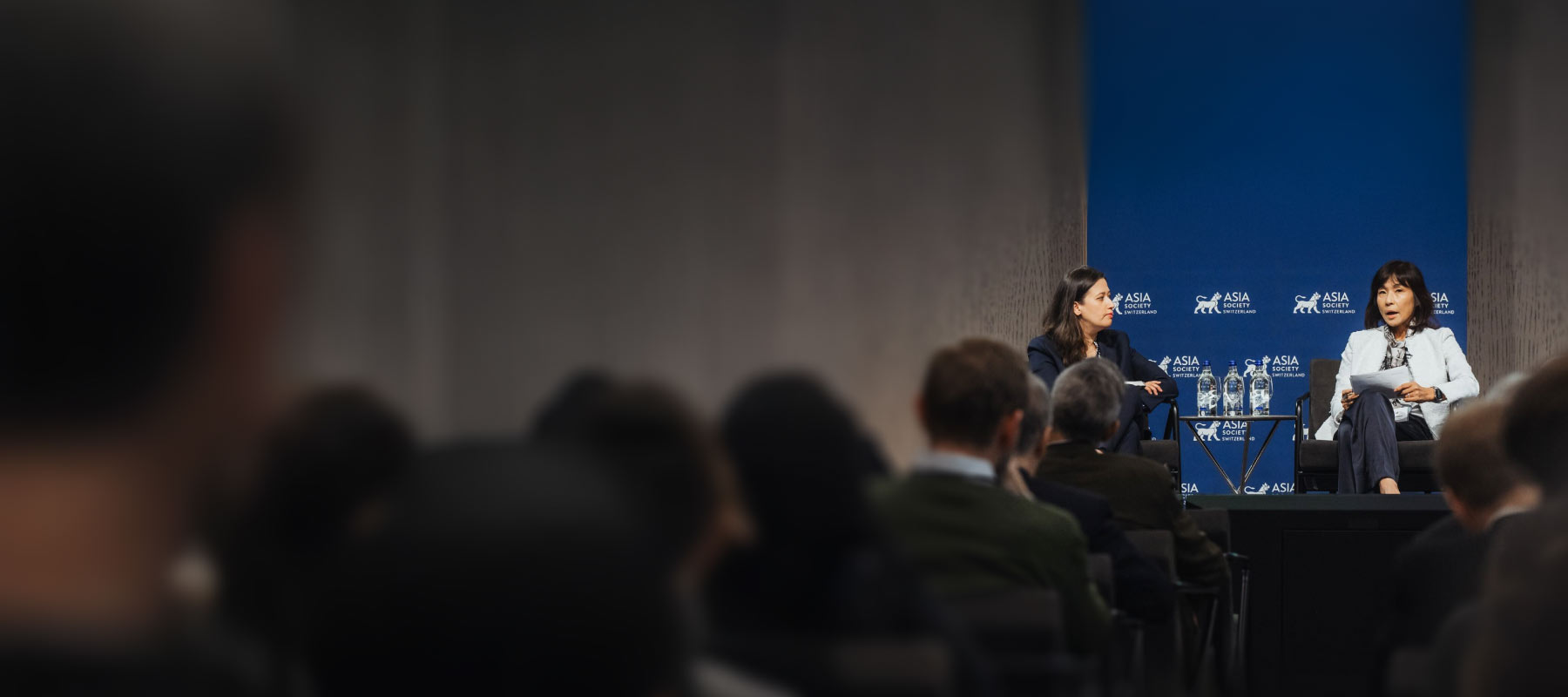
WEF Unplugged: Geopolitics, sustainability, and a look behind the scenes
Live from Davos: IMD’s Julia Binder and David Bach cut through the headlines on geopolitics, AI, energy – and competing visions for the international order....

by Öykü Işık, Amit M. Joshi, Sarah E. Toms, Misiek Piskorski, Alyson Meister, Arturo Bris, Natalia Olynec, Knut Haanaes, Heather Cairns-Lee, Alexander Fleischmann Published January 19, 2024 in Leadership • 8 min read
Global leaders and business executives descended on the Swiss ski resort of Davos to take the pulse of the global trends and thinking at this year’s World Economic Forum (WEF) Annual Meeting. Themed around re-building trust, geopolitics and AI were top of the agenda, with the latter pervading conversations from diversity, equity, and inclusion (DE&I) to mental health.
Here are some of the main takeaways from IMD faculty and staff:
AI dominated the discussion at Davos, and Open AI’s CEO Sam Altman was one of the big names in attendance. Many big tech firms, including Salesforce and Microsoft, took over the shopfronts along Davos’ main promenade and a dedicated AI house was a popular attraction outside of the Congress Center, while almost every other house had panels devoted to the topic. But it was questionable if any progress was made on the important issues.
“Despite the hype, I did not really hear anything new. It was for sure interesting to hear several political leaders discussing AI, but it does not seem to – yet – go beyond the sentiment of ‘we are finished if we do not act now,’” said Öykü Işik, Professor of Digital Strategy and Cybersecurity. “When it comes to industry leaders, I can’t help but wonder when we will get past the ‘it’s time to jump on AI message.’ Even when it comes to risks, it was underwhelming to hear the same examples being shared.”
With AI sucking up a lot of the oxygen, there was also significantly less discussion this year on other equally valuable topics, such as cybersecurity and quantum computing, she added.
Amit Joshi, Professor of AI, Analytics and Marketing Strategy, agreed: “Everyone remains very concerned about the potential downsides of this technology, sometimes even more than the upsides.” Regulation continues to be a sticking point, especially on issues like copyright and misinformation management, he added.
A desire for properly considered public regulation and clearer guidelines from companies around the use of GenAI was one of the findings in the new whitepaper Charting the Future: Switzerland’s Path to Generative AI Leadership in 2024 and Beyond co-authored by IMD, digitalswitzerland, and EPFL which was presented at Davos.
Joshi noted that GenAI is moving from curiosity to application and creating value. Yet, companies and even countries may be underestimating the resources and efforts that would be required to positively manage this technology, he said.
Many of the conversations at Davos revolved around AI’s potential as a ‘co-pilot’, which can enhance productivity but will depend on humans continuing to exercise their own expertise and judgment rather than fully trusting the results. Because of this, basic skills like digital literacy and distinguishing facts will become increasingly important.
“With the advent of GenAI, we will see tremendous changes to the world of work,” said Alexander Fleischmann, IMD Research Affiliate. “A massive reskilling is due, which opens up a huge opportunity for DE&I work to provide opportunities for underrepresented groups. These changes will also impact what leadership looks like, and inclusive skills will be needed more than ever to make this change a collective process,” he said.

“Everyone I met at Davos was a change agent, working on furthering our education, sustainability, and just development efforts, or working on new business models, often using recent developments in AI or tokenization.”- Misiek Piskorski, Professor of Digital Strategy, Analytics and Innovation and Dean of IMD Asia and Oceania
Despite the recent backlash against DE&I, Heather Cairns-Lee, Affiliate Professor of Leadership and Communication and co-author with Fleischmann of the white paper Inclusive Language and Images, noted the power of language to unite or divide, to heal or harm and to reflect and shape culture. Greater attention is needed to the use of inclusive language to create more inclusive societies and close the gender gap,” she said.
Sarah Toms, IMD’s Chief Learning Innovation Officer, was inspired by the diversity represented in the Davos events, lounges, and houses, with the Female Quotient’s (FQ) Equality Lounge often packed and featuring high-profile speakers. IMD is an academic partner to the FQ.
“The quality of several women-led initiatives presented some of the highest quality conversations, where experts challenged audiences to think boldly in novel ways. Of course, GenAI was central to many of these conversations – on stage and off stage. At the intersection of the world’s most difficult issues, like climate change and equality, there seems to be optimism for the future where technological advancements could help to deliver solutions,” she said.
Misiek Piskorski, Professor of Digital Strategy, Analytics and Innovation and Dean of IMD Asia and Oceania, was similarly struck by the diversity of the crowd at this year’s conference. He also noticed a real commitment to collaborative action.
“Everyone I met at Davos was a change agent, working on furthering our education, sustainability, and just development efforts, or working on new business models, often using recent developments in AI or tokenization,” he said. “They hailed from Japan, China, Singapore, India, the UAE, Ethiopia, Europe, and the Americas, and they were all incredibly open to share their visions with others, but also to learn from others. Through these diverse conversations with people from across the globe, I came away with at least 10 different ideas of how we can better deliver on IMD’s mission of developing leaders who make a positive change in the world.”
Against the backdrop of wars in Europe and the Middle East, geopolitics remained a top focus this year with Ukraine’s President Volodymyr Zelenskyy in town to hold high-level talks and make sure the conflict remained at the forefront of executives’ minds.
“Ukraine had a strong presence at Davos, reviving discussions on the price of freedom and democracy, as well as the need for Western support for Ukraine and strengthening sanctions against Russia,” said IMD Chief Sustainability Officer Natalia Olynec.

“The Ukraine House was prominently located on the main thoroughfare with the slogan ‘Deciding Your Tomorrow’, reminding the world of what’s at stake after almost 700 days of Russian invasion – a global food crisis, broader international war, spreading cyberwarfare, and a serious threat to rules-based order.”
How to tackle the mounting crisis of workforce mental health has moved up the agenda, with sessions on this topic outside the Congress Center taking place to packed audiences.
While stress levels in the workplace are still at an all-time high, employees are taking a more active approach to managing mental health, said Alyson Meister, Professor of Leadership and Organizational Change. This is supported by employers who are increasingly investing in well-being. “That said, initiatives that focus on solving the symptoms and don’t get to the root of stress-related problems at work do not move the needle,” she said. “Organizations need to develop and promote sustainable, inclusive working cultures.”
Huge advances in digital and AI-related solutions for mental and brain health and well-being are allowing organizations to better prevent burnout and offer more tailored and personalized well-being solutions to employees. This includes the use of predictive analytics that can detect stress through your retina, allowing for preventative interventions. There are also some fascinating breakthroughs being made in neuropsychiatry, precision pharmaceuticals, and personalized medicine for mental health.
As the world faces a loneliness crisis, more people are turning to chatbots for interaction. That’s an upside to the technology, but it has the potential to damage social skills and human communities, added Meister.
While it may have been pushed off the top agenda by AI, there was still a healthy discussion around sustainability and climate in some of the events outside the main Congress Center.
The WEF’s Global Risks Report, published ahead of the annual meeting, named extreme weather events, critical change to Earth’s systems, biodiversity loss and ecosystem collapse, and natural resources shortages as the top global risks over the next 10 years, underscoring that the topic can’t afford to be sidelined.
“Sustainability featured as one of the biggest mega transformations of our era, which can be accelerated through digitalization and inclusive leadership. This requires greater transparency and accountability throughout value chains,” said Olynec who was speaking on a panel called “Women In Tech & Allyship at the WORLD WOMEN FOUNDATION 2024.
That said, initiatives that focus on solving the symptoms and don’t get to the root of stress-related problems at work do not move the needle.- Alyson Meister, Professor of Leadership and Organizational Change
“Davos this year was about rebuilding trust where collaboration on sustainability was in focus,” said Professor of Strategy and Lundin Chair Professor of Sustainability Knut Haanaes, who moderated a session with B Lab attended by almost 200 board members on topics such as industry alliances, business opportunities, making governance work, and inspiring change. “One big takeaway for me is that sustainability is now becoming a strong movement,” he said.
“The WEF is primarily an economic forum, and because of that we should not be derailed by other conversations taking place collaterally about inclusion or sustainability,” stressed Arturo Bris, Professor of Finance and Director of the World Competitiveness Center.
He noted that the WEF Global Risks report highlighted two key challenges for 2024: misinformation and geopolitical risk.
“My takeaway is that, in the context of uncertainties that cannot be managed by corporate executives, we need better governments, more collaboration between the public and the private sector, and more organizational agility to respond fast to unexpected crises.
“With respect to AI, we saw COP28 to the power of three: agreements on the need for a global regulatory framework without a way forward, no clear consensus about the impact of AI on our economies, and the realization it is too early to assess the costs and benefits.”

Professor of Digital Strategy and Cybersecurity at IMD
Öykü Işık is Professor of Digital Strategy and Cybersecurity at IMD, where she leads the Cybersecurity Risk and Strategy program and co-directs the Generative AI for Business Sprint. She is an expert on digital resilience and the ways in which disruptive technologies challenge our society and organizations. Named on the Thinkers50 Radar 2022 list of up-and-coming global thought leaders, she helps businesses to tackle cybersecurity, data privacy, and digital ethics challenges, and enables CEOs and other executives to understand these issues.

Professor of AI, Analytics and Marketing Strategy at IMD
Amit Joshi is Professor of AI, Analytics, and Marketing Strategy at IMD and Program Director of the AI Strategy and Implementation program, Generative AI for Business Sprint, and the Business Analytics for Leaders course. He specializes in helping organizations use artificial intelligence and develop their big data, analytics, and AI capabilities. An award-winning professor and researcher, he has extensive experience of AI and analytics-driven transformations in industries such as banking, fintech, retail, automotive, telecoms, and pharma.

Chief Innovation Officer
Sarah Toms is Chief Innovation Officer at IMD. She leads information technology, learning innovation, Strategic Talent Solutions, and the AI Strategy. A demonstrated thought leader in education innovation, Sarah is passionate about amplifying IMD’s mission to drive positive impact for individuals, organizations, and society.
She previously co-founded Wharton Interactive, an initiative at the Wharton School that has scaled globally. Sarah has been on the Executive Committee of Reimagine Education for almost a decade, and was one of the ten globally to be selected as an AWS Education Champion. Her other great passion is supporting organizations who work to attract and promote women and girls into STEM.
She has spent nearly three decades working at the bleeding edge of technology, and was an entrepreneur for over a decade, founding companies that built global CRM, product development, productivity management, and financial systems. Sarah is also coauthor of The Customer Centricity Playbook, the Digital Book Awards 2019 Best Business Book.

Professor of Digital Strategy, Analytics and Innovation and Dean of Executive Education
Mikołaj Jan Piskorski, who often goes by the name Misiek, is a Professor of Digital Strategy, Analytics and Innovation and the Dean of Executive Education, responsible for Custom and Open programs at IMD. Professor Piskorski is an expert on digital strategy, platform strategy, and the process of digital business transformation. He is Co-Director of the AI Strategy and Implementation program.

Hilti Professor of Leadership and Dean of Degree Programs
Alyson Meister is Hilti Professor of Leadership and Dean of Degree Programs at IMD. Specializing in the development of globally oriented, adaptive, and inclusive organizations, she has worked with executives, teams, and organizations from professional services to industrial goods and technology. She also serves as co-chair of One Mind at Work’s Scientific Advisory Committee, with a focus on advancing mental health in the workplace. Follow her on Twitter: @alymeister.

Professor of Finance at IMD
Arturo Bris is Douglas Geertz IMEDE 1988 Professor in Geopolitics and Business and Professor of Finance at IMD. Since January 2014, he has led the world-renowned IMD World Competitiveness Center. At IMD, Bris directs the Boards and Risks program and Blockchain and the Future of Finance program. He also previously directed the flagship Advanced Strategic Management program between 2009 and 2013.

Chief Sustainability Officer at IMD
Natalia is the Chief Sustainability Officer at IMD. She designs and implements sustainability strategy, develops executive education programs and advisory, publishes research, builds cross-sector partnerships, and communicates IMD’s ambitions and progress. The Center for Sustainable and Inclusive Business, co-led by Olynec, aims to support leaders and companies to take steps towards a more sustainable and inclusive business world by harnessing IMD’s knowledge and expertise in this field and offering tools to help them deliver systemic, innovative, and impactful responses.

Lundin Chair Professor of Sustainability at IMD
Knut Haanaes is a former Dean of the Global Leadership Institute at the World Economic Forum. He was previously a Senior Partner at the Boston Consulting Group and founded their first sustainability practice. At IMD he teaches in many of the key programs, including the MBA, and is Co-Director of the Leading Sustainable Business Transformation program (LSBT) and the Driving Sustainability from the Boardroom (DSB) program. His research interests are related to strategy, digital transformation, and sustainability.

Affiliate Professor of Leadership and Communication
Heather Cairns-Lee is Affiliate Professor of Leadership and Communication at IMD. She is a member of IMD’s Equity, Inclusion and Diversity Council and an experienced executive coach. She works to develop reflective and responsible leaders and caring inclusive cultures in organizations and society.

Equity, Inclusion and Diversity Research Affiliate
Alexander received his PhD in organization studies from WU Vienna University of Economics and Business researching diversity in alternative organizations. His research focuses on inclusion and how it is measured, inclusive language and images, ableism and LGBTQ+ at work as well as possibilities to organize solidarity. His work has appeared in, amongst others, Organization; Work, Employment and Society; Journal of Management and Organization and Gender in Management: An International Journal.

January 23, 2026 • by David Bach, Julia Binder in Economics
Live from Davos: IMD’s Julia Binder and David Bach cut through the headlines on geopolitics, AI, energy – and competing visions for the international order....

July 31, 2025 • by Fabian Grimm in Economics
As global economic tensions persist, the economies that win the “negotiations over percentages battle” are taking the media spotlight. However, the economies and regions that recognize deeper patterns of adaptation and position...

December 26, 2024 • by Richard Baldwin, Simon J. Evenett, Carlos Cordon in Economics
From tariffs to supply chain challenges, IMD experts predict the factors that will shape international trade in 2025....

December 20, 2024 • by Nico Luchsinger in Economics
As Asia's economic landscape evolves, three distinct narratives emerge: Japan's structural renaissance, China's growth challenges, and India's manufacturing aspirations. Understanding these intersecting stories is crucial for global businesses and policymakers navigating the...
Explore first person business intelligence from top minds curated for a global executive audience